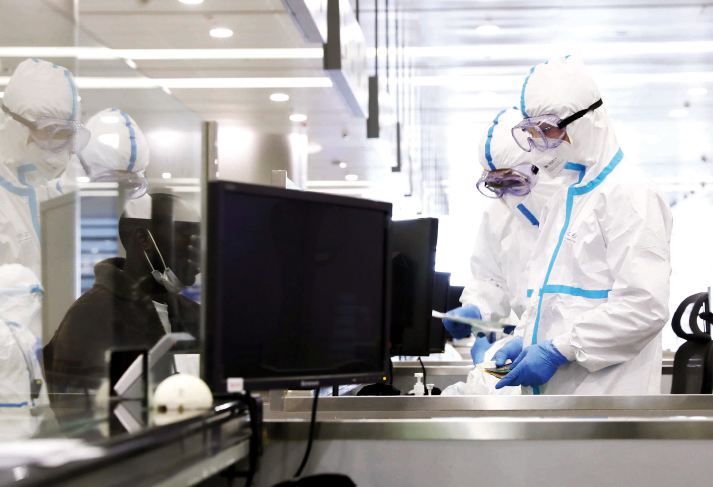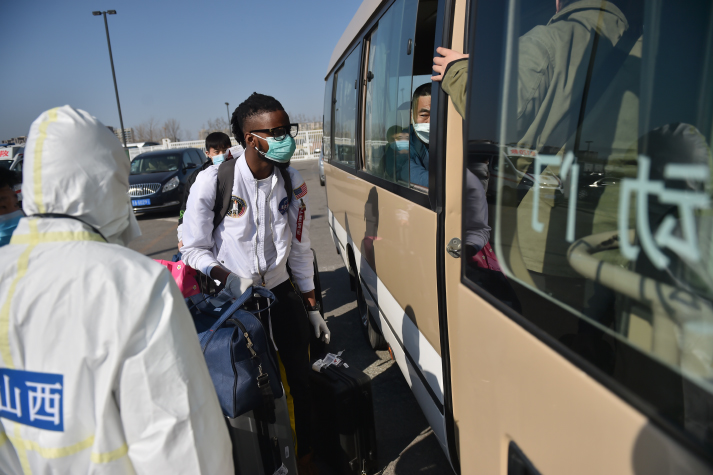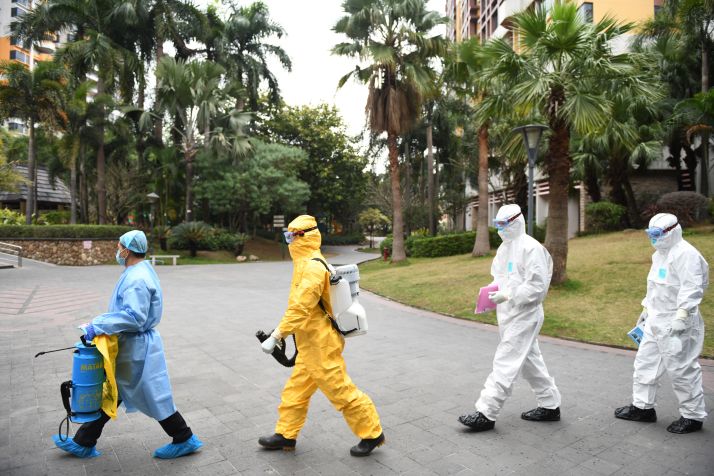|
||||||||||
| Home Nation World Business Opinion Lifestyle ChinAfrica Multimedia Columnists Documents Special Reports |
|
||||||||||
| Home Nation World Business Opinion Lifestyle ChinAfrica Multimedia Columnists Documents Special Reports |
| China-Africa Cooperation in Fighting COVID-19 |
| China adopts stricter measures to curb the rise of imported cases of COVID-19 |
| By Xia Yuanyuan | VOL.12 May ·2020-04-29 |

Along with the rest of China and the world at large, Rwehumbiza is now trying to stay safe in the face of the deadly novel coronavirus disease (COVID-19). He was recently placed under self-quarantine at home, following local regulations, but despite the inconvenience, he's not complaining.
"From what I believe and what I have seen, the Chinese Government has been working very hard [in the efforts to combat COVID-19]," he said in an interview with CGTN. "When they [authorities] came to quarantine me, I knew they are trying their best to contain the problem."
His remarks came amid viral international media reports in early April alleged that Africans in Guangzhou were faced with maltreatment and discrimination during the implementation of anti-epidemic regulations by local authorities.
After several months' of dedicated efforts, China has achieved remarkable progress against the epidemic, thanks to a series of comprehensive, rigorous and thorough measures. However, the country still faces great risks of new imported cases of COVID-19 and a domestic resurgence of the disease.
To prevent imported infections, China has taken stricter measures, requiring that everyone in China, whether foreigners or Chinese, follow the same rules, including medical treatment and community-based quarantine, according to the National Health Commission.
Facing the epidemic, China hasn't applied any extra quarantine measures on someone just because they are foreigners, nor has the country reduced or relaxed those measures just because people are foreigners, according to Zhao Lijian, spokesperson of the Chinese Foreign Ministry.

As of April 13, a total of 111 African people in Guangzhou have tested positive for COVID-19, local authorities said. Among them, 19 were imported cases.
The city is not the only one faced with serious imported infections. In the 24 hours of April 13 alone, northeast China's Heilongjiang Province saw 79 new confirmed COVID-19 infections, all of which were imported. In Shanghai, on April 11, 51 Chinese nationals flying on the same flight from Russia tested positive, while 21 cases involved Chinese nationals traveling from Russia to Heilongjiang.
For China, containing these cases will be helpful to containing the spread of the virus. People are worrying that the country may face a new wave of coronavirus infections, as the number of imported cases are expected to rise sharply.
China's senior medical advisor Zhong Nanshan warned that although China has made some achievements in the earlier stages of the epidemic, as the coronavirus is still spreading rapidly outside of the country, China could see a return of infections.
To lower the risks brought about by imported cases, China has implemented stricter quarantine measures and more stringent contact tracing and screening to contain the disease, for both foreigners and Chinese.
In Beijing, from March 19, all travelers from overseas had to be placed under quarantine in designated places for 14 days on arrival in the city, according to the capital's leading virus prevention group.
Guangzhou, known for having a large African community, had screenings carried out before March 21 to intercept any potential risks brought by travelers from overseas. All travelers entering the Chinese mainland through checkpoints into the province were required to take nucleic acid tests for COVID-19 and undergo a 14-day quarantine at designated locations from March 27.
"It is by resolutely implementing these strict measures that the country has suppressed the spread of the virus in a short time," Zhang Zhongxiang, Deputy Director of the Center for African Studies at Shanghai Normal University, told ChinAfrica.
"Timely detection COVID-19 cases based on proactive screening is an important measure to ensure the safety of the lives and health of African people in Guangzhou," said Tang Xiaoping, Director of the Guangzhou municipal health commission.
No discrimination
With stricter quarantine measures, there is always a chance that it may trigger some misunderstandings and even displeasure among people who may feel they are being targeted.
On April 12, Guangzhou Mayor Wen Guohui stressed that in preventing and controlling imported cases of COVID-19, foreigners would not be discriminated against.
"The measures, including nucleic acid tests and two weeks of quarantine, cover all inbound passengers from abroad, including both Chinese and foreign people, and not only foreigners," said Wen.
He was commenting on the wave of Western media reports alleging that Africans in Guangzhou are being unfairly treated and were victims of racism.
The reports began on April 9, with videos from Africans in Guangzhou complaining of racism being posted on social media. These videos were picked up by some international blogs and mainstream media and the story immediately gained momentum. The videos also showed Chinese police "arresting" Africans in a clampdown related to COVID-19.
Meanwhile on China's social media sites, a video of a Nigerian man who had tested positive for COVID-19 beating a nurse to escape quarantine in Guangzhou also caused an uproar among Chinese.
The 47-year-old Nigerian man arrived in Guangzhou from overseas on March 20 and despite testing positive refused to be quarantined in a hospital and assaulted a nurse who tried to stop him from leaving.
"It is hard to avoid contradiction and misunderstanding toward anti-pandemic measures," said He Wenping, a research fellow with the Institute of West-Asian and African Studies at the Chinese Academy of Social Sciences. She told ChinAfrica these incidents had nothing to do with racism and the complaints about Africans in Guangzhou are "exaggerated."
However in response to these allegations of discrimination from the African community, Guangzhou authorities reiterated their firm stance to treat foreigners and locals equally.
"We take the same prevention and control measures for all people entering Guangzhou regardless of their nationality, race and gender," said Liu Baochun, Director of the city's foreign affairs office. "We also hope that foreign residents in Guangzhou can strictly abide by local pandemic prevention regulations as the Chinese do."
According to He, if Africans violated Chinese law, they should be punished. "And if the police really conduct illegal law enforcement, we should correct it. But individual cases should not be generalized," she said.
Commenting on the issue, Rwehumbiza said in the 10 years he had been in Guangzhou he had never experienced any kind of discrimination.

Wrong interpretation
Referring to the rumors of discrimination in Guangzhou, on April 14, Nigerian Foreign Minister Geoffrey Onyeama refuted the slander.
To lower the risks brought by imported cases, Guangzhou has implemented strict quarantine measures, he said. "However, it was misinterpreted by some of the Nigerians and Africans," said Onyeama. "[They] could not understand why it seems to be selective and targeting only them," he added.
Onyeama said some media incorrectly interpreted the issue based solely on videos on social media platforms and alleged that Nigerians, and other African people in general, were being discriminated against in Guangzhou.
"I am happy to say that we have re-established and stabilized the situation together with the Chinese Government," said Onyeama.
Onyeama noted there is nothing wrong with Guangzhou applying strict anti-epidemic policies based on the experience of Wuhan, but he also suggested Guangzhou authorities improve their communication while implementing the policies.
"Conflicts have no benefit, but hurt China-Africa relations," He Wenping told ChinAfrica.
"Guangzhou authorities should ensure more communication with local Africans to keep them up to date with the prevention and control work," she said.
Bond of friendship
Assistant Foreign Minister Chen Xiaodong called for strengthened unity between China and Africa when he met with ambassadors and representatives from over 20 African nations on April 13.
Chen said China is enhancing the efforts to be responsible for not only Chinese but also foreigners in Guangdong, including Africans. China attaches great importance to concerns of some African diplomats over disease control measures taken by the provincial capital Guangzhou, and authorities are improving such measures, said Chen.
Along with several African countries individually inviting respective Chinese ambassadors to discuss the issue, Deputy Chairperson of the African Union (AU) Commission Kwesi Quartey also spoke to Chinese Ambassador to the AU Liu Yuxi on how the matter could be resolved.
China's Foreign Minister Wang Yi said China-Africa friendship is rock-solid and will not be affected by a single incident.
During a phone conversation with Chairperson of the AU Commission Moussa Faki Mahamat, Wang said China and Africa, as comprehensive strategic cooperative partners, should strengthen coordination and cooperation in response to the common challenge of COVID-19.
Wang said China remembers that at the difficult moment in its fight to contain the novel coronavirus outbreak, the AU and countries of Africa rendered support, which fully demonstrated the brotherly ties between Africa and China. He clearly opposed any attempt to politicize the pandemic.
"The Chinese people always see in the African people partners and brothers through thick and thin. African friends can count on getting a fair, just, cordial and friendly reception in China," said Foreign Ministry spokesperson Zhao.
(Print Edition Title: Equal Before Law)
Comments to xyy@chinafrica.cn
|
||||||||||||
| About Us | Contact Us | Advertise with Us | Subscribe |
| Copyright Beijing Review All rights reserved 京ICP备08005356号-5 京公网安备110102005860号 |